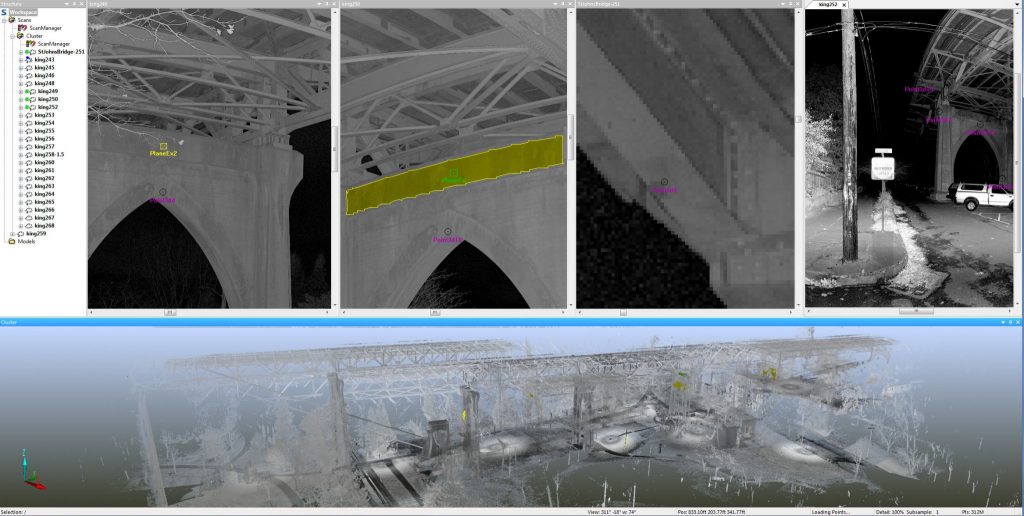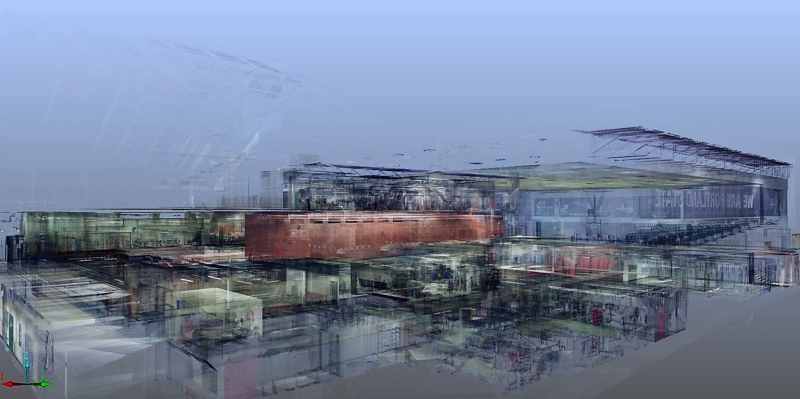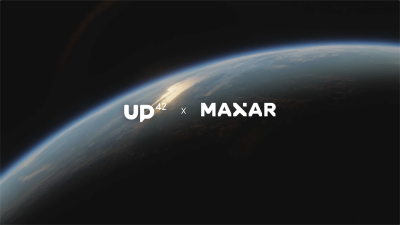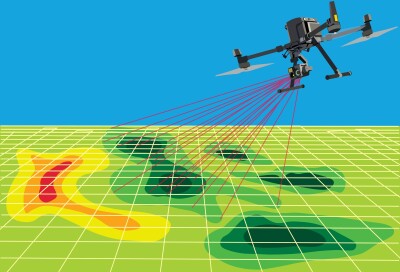I spent a couple of days last week at the Illinois Professional Land Surveyors Association (IPLSA) conference. There, a presenter named Todd Horton was discussing the difference between an expert and a professional, and he made an interesting comparison that has been on my mind ever since. During his presentation, Mr. Horton pulled some stock photos of professionals like doctors, attorneys, architects, and so on. They all showed smiling, good-looking people working with others. The tools of each trade let you know which is the professional and which is the client, but each one showed some level of professional engagement. Then he showed stock images of a land surveyor. Most showed a guy and his total station, some also showed another person, but that was usually an assistant or coworker. It was a whole lot easier to find pics of a surveyor with his truck than with a client!

Registering and assembling a point cloud.
While I know that many in the reality capture space are not land surveyors, I couldn’t help but be struck by the similarities. Both groups tend to focus on technological innovations as the solution to the problem. I get it—we like our toys, we get to work with some of the coolest tech out there, and we love to talk about it! Is it a hindrance that we’re focusing on the tools of solution instead of the process of solving a problem, or is it simply the way our industry works?
Perhaps we should start by looking at some of the reasons why we tend to be this way. When I think of all of my friends and coworkers in the reality capture space, some fairly similar traits come to mind: they are forward thinking, technologically savvy, self-motivated, results oriented, and efficient. These people seem to excel. Don’t take this the wrong way but I go through a lot of adjectives before I get to patient, empathetic, sensitive, and all those other qualities we look for in someone we want to tell our problems to. And, in fact, that is exactly what most of us are asking our clients to do!
Now, just because I recognize this does not mean that I am good at practicing it. I’m one of those people that cringe a bit when I see the client (or anyone for that matter) walk up to me while I’m scanning/surveying/imaging. It’s not that I don’t like people, it’s just that I hear this clock ticking in my head, reinforcing that I am losing time and not being as “productive” as I should be. But here is the rub: “efficient” and “productive” are not always the same thing! Spending a few minutes attentively listening to that client instead of maximizing my collection rate is probably a better investment than the $100 I might lose in a lump sum contract by taking a few extra minutes to complete a scan. So why is it so hard to do?!

Point cloud of Portland State University, credit ToPa3D
As I said before, it may simply be a function of the type of personalities drawn to the various fields that use reality capture. For me, it is a side effect of years and years spent trying to be the most efficient and productive member of any team I was on. But, getting the job done has always been easier to me than getting the job and I’m beginning to wonder if this isn’t some of the reason.
So, back to my original question, is this a problem? I think that it is.
First of all, our overemphasis on technology undersells our professional capabilities. We all know that landing new clients is more expensive than getting repeat business from existing clients. If one of those existing clients is with my firm simply because of our technology, he is much more likely to move to another firm as soon as he sees that they have a new toy that I haven’t told him about. I think you have a much better chance of retaining your client (and saving your money) if they trust that you, rather than your piece of equipment, will service their needs. To that end, I have quit marketing my hardware. I still market my deliverables, and to those in our space it is obvious that they are tied to specific hardware and software solutions but I see no value in pushing that distinction on my clientele.
Secondly, there is the ever-present specter of commoditization. If there is no discernable difference between me and a hundred other firms with similar tech, then why would a client not simply go with the lowest bidder? This ultimately results in downward pressures on pricing to the point that we find ourselves unable to charge enough to replace our equipment as it becomes outdated (much less pay our selves or staff a decent wage). It’s a situation that should look very familiar to the land surveyors in our crowd.
In conclusion, I must agree with Mr. Horton. Many of us are experts at capturing and processing reality capture data. But our clients are looking for a professional service to address their problems. While it often requires expertise, expertise alone will not suffice. What they really need is more likely to be between your ears than in the bed of your truck. Maybe it’s time our marketing and time management reflected that.






